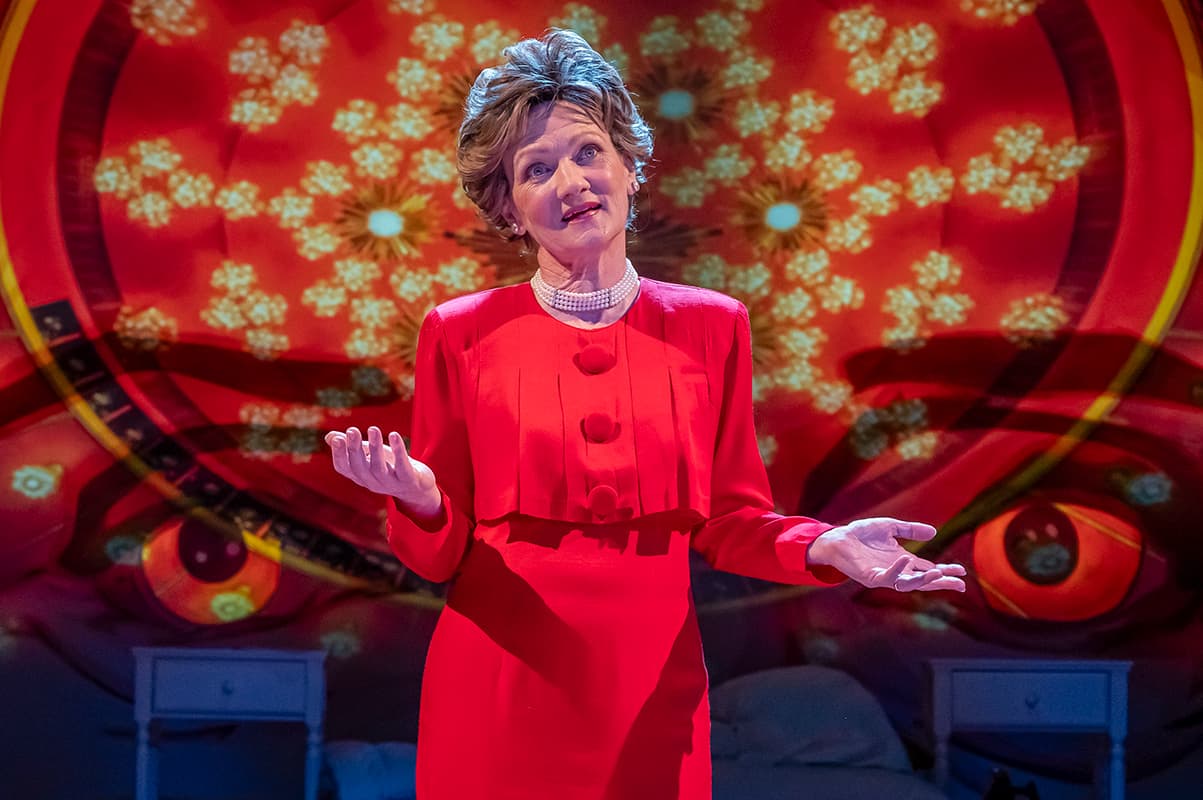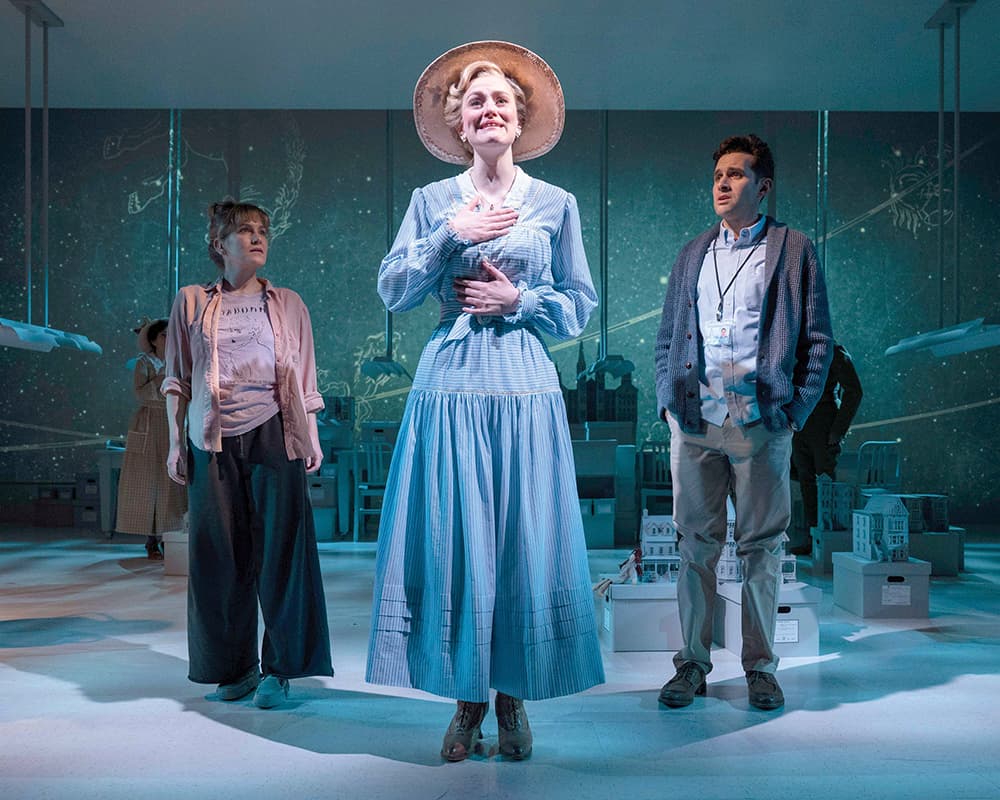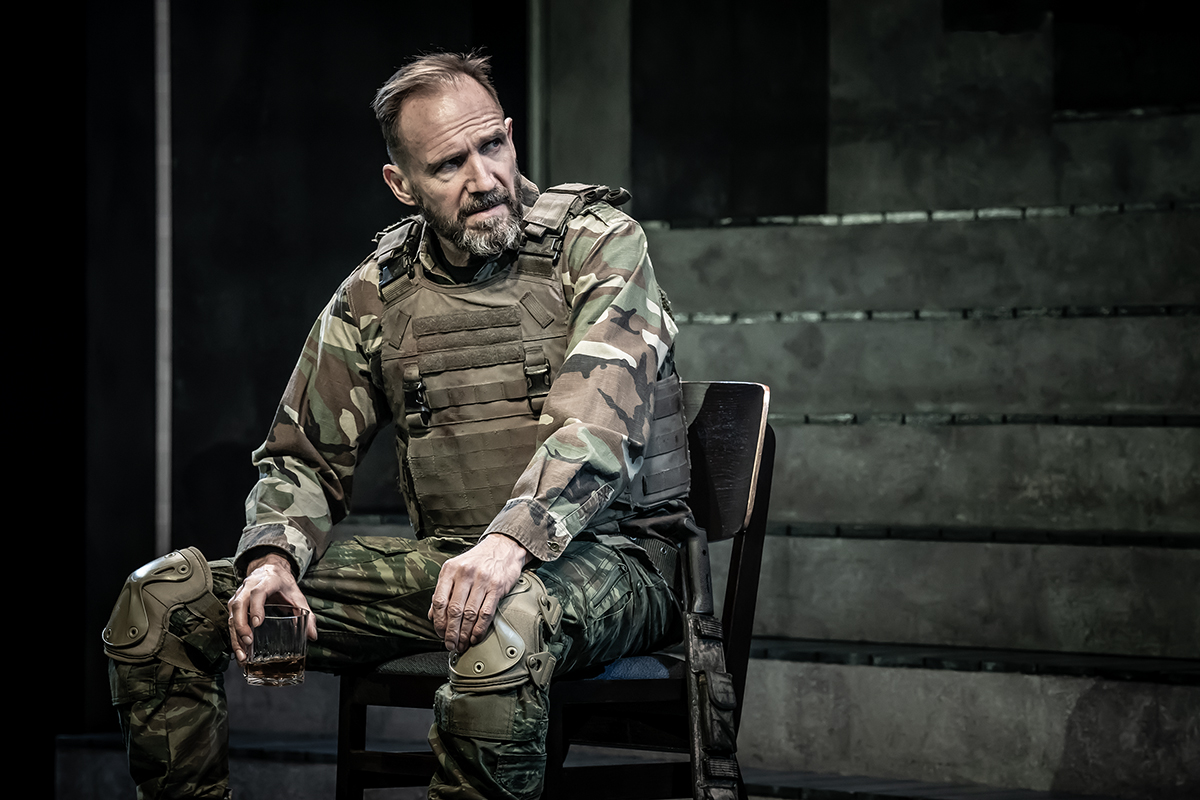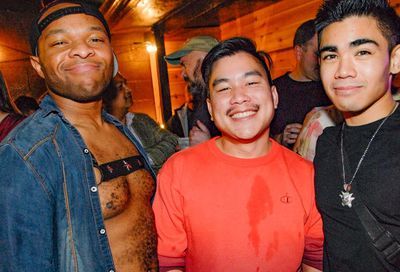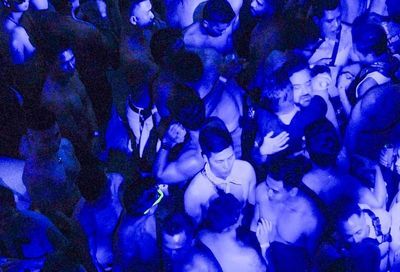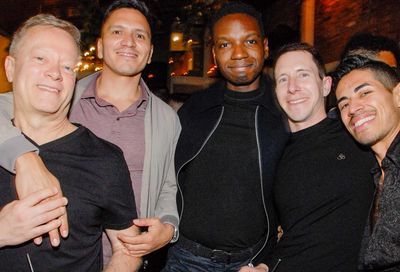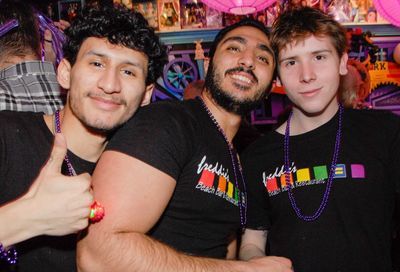Mosaic Theater’s Reginald L. Douglas is Leading with Joy
Mosaic's artistic director offers a peek behind the scenes of running one of D.C.'s hottest theater companies.

Reginald L. Douglas meets me at the stage door of the Atlas Theater Center with a ready smile. Dressed in shorts and a pair of spotless sneakers, Douglas, the Artistic Director of Mosaic Theater Company, which is based at the Atlas, is prepared to offer a tour backstage of their latest production, Monumental Travesties, written by playwright-in-residence Psalmayene 24.
“My thought was we would go to the rehearsal room, show you that,” he says, leading me through a maze of hallways, and up a stairway to the second floor. “And then meet Psalm and everybody, and then we could sneak peek into the theater.”
Douglas is directing Monumental Travesties, a sharp, D.C.-set comedy centered around a Black performance artist’s radical response to the Emancipation Memorial, that statue of Lincoln lording over a formerly enslaved man on his knees erected nearly 150 years ago in Capitol Hill’s Lincoln Park.
Featuring Renee Elizabeth Wilson, Jonathan Feuer, and Louis E. Davis, as the artist, Chance, who removes Lincoln’s head and leaves it in his neighbor’s bushes, the play marks the beginning of Douglas’ second full season helming Mosaic alongside managing director and co-founder Serge Seiden.
One of the few Black gay artistic directors in the nation stewarding a professional regional company, Douglas admits he isn’t immune to pressure, but his overriding sense of excitement and enthusiasm permeates the building.
“Produce from a place of peace,” he says. “I find us theater people, sometimes it’s like, it always has to be crazy and frantic. I was like, actually we can just be organized and efficient and kind. So that’s our spirit.”
In that spirit, Douglas has been producing and directing since he was a third-grader staging an originally devised puppet production of Winnie the Pooh with a cast of Beanie Babies.
“I was a theater kid, arts kid my whole life and I went to Sister Circle, a theater camp with Miss Elaine,” he recalls. “It was a Christian theater camp and Miss Elaine wrote new musicals and new plays, so I’ve always been surrounded by new work. I was the precocious and/or annoying kid who was like, ‘Why this? We should do it like this. Try it like that.’ She said, Reggie, ‘You’re a director,’ and I never looked back.”
Douglas has gone on to direct acclaimed work everywhere from the La Jolla Playhouse to New York Theatre Workshop, Pittsburgh’s City Theatre, where he served as Artistic Producer, and D.C.’s Studio Theatre, where he served as Associate Artistic Director.
“I always thank Miss Elaine for sparking that flame for me,” he says fondly. A few yards away, her pupil’s latest production appears to be coming together smoothly. Inside Atlas’ Sprenger Theatre, the production crew has just finished erecting an impressive staircase on Andrew R. Cohen’s rowhouse set.
Outside the rehearsal room where one of the actors is working on the show’s surprise character, we run into the playwright, Psalmayene 24, cool and composed as he lets me in on the inspiration that led them all here.
“I was inspired by my discomfort and, honestly, disgust with the monument,” says Psalm. “I needed a way to metabolize and transform those feelings. I figured writing a play would be the best way to do that since I’m a theater artist.”
Like many of our nation’s monuments to itself, especially those erected between the 1860s and the 1960s, the Emancipation Memorial definitely sparks strong feelings and opinions. Psalmayene recalls first spotting the statue in the mid-nineties during his time at Howard.
“It always was sort of this nagging thorn in my mind,” he says. “So it was something that I just could never really shake, and it was an image that really just stayed with me.”
Douglas also had a powerful reaction to the memorial, which he took his cast to visit during their first week of rehearsal. The director had himself only seen it for the first time in person two days before rehearsal started.
“I waited until the last minute to go and see the character face to face. And the thing I was most struck by were the passersby, particularly the children that noticed it and those that didn’t and their reactions to it,” he recalls.
“I was really struck by watching D.C., all ages, all races, take in this monument. And right away I went, ‘Well, a-ha, there’s our play. There’s our play.’ How do we as a community in all of our diversity take in this thing we all share from different perspectives and figure out a way to work through it? So it was a perfect way to start the rehearsal process.”

METRO WEEKLY: So, Reg? Reginald?
REGINALD L. DOUGLAS: Reg is fine.
MW: That’s nice. And speaking of nice, it’s nice to start out with a compliment, but this is really the truth. Whenever you have come up in my theater conversations, people will stop the conversation and say, “He’s such a sweetheart. He’s so nice.”
DOUGLAS: Oh! Thank you. I didn’t know what you were about to say.
MW: Well, I don’t think people do that for everybody. So to what or whom do you owe this grace and your kindness and everything that people respond to?
DOUGLAS: I receive that, and thank you. I think it’s all Lucille, it’s all Mama Lucy. I try to just lead with gratitude and grace. I like to have fun and like to laugh. So I always want to be someone that’s trying to bring a positive energy into the space rather than dysfunction or frenzy. I want to be a force for some more joy, and a lot of that’s from my family. My mom, especially, just always said, “Your character matters more than anything else.” We got to give it up for Mom for that.
MW: Give it up for her.
DOUGLAS: She’ll love that. When I tell her tonight what people say, out in the street.
MW: Yes. Somebody is going to feel proud about that. That leads to the question of where did you grow up?
DOUGLAS: I grew up in New York, was a church kid, so I grew up going. I was in gospel choirs, so I was always involved in the arts. My uncle Ron was an amazing singer and musician, and I was his protégé. I was right under his wing traveling around the tri-state area with the choir. We traveled the country. We technically recorded two CDs. I may have been lip-syncing on them because I was too scared to sing, because I knew I wasn’t really hittin’ those notes. But he just gave me the spirit of creative freedom. He encouraged me to trust my talents, to not be ashamed of them, and to really lean into the idea that church could be a place for community.
And so much of that upbringing is reflected in the work I do now. The “why” of the work for me is to bring people together to think, to talk about, to be in a spirit of joy. And that directly relates back to growing up in the Black church and also as a very political kid. So I’ve always tied community-building or community gatherings and the Black church community with a fight for civil rights, a fight for urban community development, for true diversity. I’ve always looked at the world through this political lens, as well as one that’s creative.
MW: And has the church remained that force in your life?
DOUGLAS: Yes, in its own way. I think I’m a far more spiritual person than I am religious. I have the same birthday as Oprah, so I’m always one step away from crying, one step away from an inspirational quote. I believe in Brené Brown and Iyanla, so I feel I’m a very spiritual person. A firm sense of belief in yourself.
MW: And what about the singing? Do you still?
DOUGLAS: Thank God, no. For everyone’s benefit I stay behind the scenes.
MW: That would be something somebody’s got to organize, an artistic director talent show.
DOUGLAS: Oh, that’s actually a good idea. I think the one thing is that [Round House artistic director] Ryan Rilette actually acts. He’s acting in a show right now, so it’s not really fair.
MW: It’s not a competition, it’s a talent show.
DOUGLAS: That is true. I’m all about collaboration.
MW: Yeah. Let him lift you up.
DOUGLAS: He can lift us all up. An artistic director talent show. That’d be hilarious.
MW: Keep that running. So we’re going to start at the beginning of this, your second full season?
DOUGLAS: Yeah, the second full season as artistic director where I’ve led the curation of the work that Mosaic’s producing.
MW: And why did you want to kick off this season with Monumental Travesties?
DOUGLAS: There’s so many reasons. One, Psalm is our playwright-in-residence, and any chance we get to amplify his work, support his work, it’s an easy yes.
The plays we produce at Mosaic are timely, they’re thoughtful. They want to provoke conversation about the here and now, with the goal of making us think about what could come next. “How do we use the plays of the present that maybe reflect on the past, to think about the future?” is a core question I’m always asking. And this play does that in a really surprising, interesting, funny way. Comedies are needed right now. We need some laughter. I don’t think you need to sacrifice enlightening an audience with entertaining them. We can do both and that’s what our goal with this play is.
And then we wanted to celebrate D.C. This play is very much a D.C. story. The monument’s a 15-minute walk from the Atlas. And so having a play that really does reflect this community, again, in surprising ways, is exactly the kind of work we want Mosaic to be defined by.
MW: I love the fact that it is so D.C.
DOUGLAS: It’s so D.C.

MW: Why did you want to direct it?
DOUGLAS: That’s a great question. I wanted to direct it because I was eager to work with Psalm on a play. I think he’s one of the most generous, kindest artists and collaborators, just as a staff member and artistic director relationship, and so I was eager to see how that would play out in the rehearsal room, and it’s been a gift.
I also think he’s extremely smart and the play is very smart, and so I wanted to be able to offer my own style to it, ask my questions about it from the director’s chair and not just the producer’s chair. And then also I love new plays, and this play is wonderfully raw, new. It’s fresh. Being with it from a draft all the way to opening night is a director’s dream, so I’m very grateful for the chance to help shape the story. Even in the rehearsal room today, we added a line and cut another. We are deep in the process, and being able to be at the helm of that work along with our dramaturge, Chelsea Ratigan, is a dream job.
MW: Let’s talk about the story. The Emancipation Memorial is central to the play. I can understand the statue was intended as a tribute to Lincoln, and was not necessarily meant to encompass any more than that in the mind of the artist. But as a memorial to emancipation of people, I think it fails. What are your thoughts on it?
DOUGLAS: I think the way you said that is a really great summation of my thoughts too, that there is a tribute to Lincoln, yes. But also how we are commemorating the end of slavery. And I have questions about the how. I think the thing that drew me to the play as a director, as a producer even more so, was that Psalms’ work as a playwright is not to offer an answer, it’s to raise more questions. And so the play, again, in really interesting ways, uses the statue as a catalyst to a much richer conversation about who gets to remember what and how. We all share this American history, but who tells it and from what perspective do they tell it? Who gets to listen and be told? I think that power struggle is the American struggle.
The play is not meant to be one-sided or give one answer, it’s meant to spur more conversation and it does it in a very fair way. I’m always struck by that each time I watch it, that there are so many opportunities for people to go, “A-ha” or, “Ooh, I didn’t think of it like that.” That’s a good play to me, the one that makes you talk back to it. So that’s my personal thoughts on the statue. But even more so, my love of the play is that our personal thoughts aren’t actually what’s being presented on stage, but instead a conversation about our community’s reaction to it and the multitude of responses that it elicits. That, to me, is a really exciting reason to bring people into a room.
MW: Mosaic’s next play, Confederates, also explicitly evokes the slavery era. Apparently Mexodus, later in the season, does as well.
DOUGLAS: Yes.
MW: Were these plays all sort of in line? Did these themes just come up out of nowhere? Because obviously there’s the question we’re dealing with now of states literally teaching that slavery is beneficial. So the timing of this is really perfect.
DOUGLAS: Yeah. It’s such a funny chicken and egg, because it didn’t occur to us until we put the season together that, “Oh wow, these plays are speaking to each other in different ways.” And one of those ways is looking back at American slavery through different lenses. What I love about each of the plays and the playwrights is how different they are, both in style and in content. A musical, a comedy, a drama. A Black woman playwright, Latino and Black musicians, and then a Black playwright from D.C. who lives in D.C.
And in terms of the urgency of the work, we couldn’t get more timely when we do have people trying to erase history. I feel very proud that we are doing whatever we can as artists and as a theater company to say, “No, no, that’s not the case.” These stories must be told and must be heard, and we’re inviting all ages to experience them. So having student matinees, having intergenerational matinees, we reach out to seniors and everyone in between to re-contextualize, to better understand our history. It makes the work feel even more purposeful right now.
MW: Oh, wait. I left the play Nancy out of that because I don’t know if there’s slavery in Nancy. Is there?
DOUGLAS: There’s not, but there are Reagans. [Laughs.] But again, I think what Rhiana Yazzie and Ken-Matt Martin are doing in that play is taking, again, moments from more recent history and reexamining them particularly through a Native American lens.
What drew me to all four of these plays and made us want to produce them, is that there is surprise inherent in the plot, that the premise the writer is working through is surprising and different and unique. They’re new, they’re fresh takes on where we’ve been. And that’s what I think theater needs to be right now — urgent and timely, yes, but also raising questions in a new way because maybe then someone will hear them in a different way. And if our goal is always to see your neighbor as yourself, we want to show you multitudes of your neighbors in different ways. So I do think even with the thread of slavery that permeates three of the shows, and this idea of history being revisited that ties the whole season together, the greatest gift, to me, of these plays and how they speak to each other is fresh voices telling fresh stories.
MW: Can you put your philosophy into words for me, about new plays?
DOUGLAS: It’s our job as artists to tell the story of what it means to be alive today. When I was a kid and I went to the library or the drama bookshop in New York City, I didn’t see as many plays that centered on people like me, or that spoke to who my friends were, who my family was. And that’s an urgent responsibility that I don’t take lightly, to help tell the story of who we were. So that when you go in the record books and you look back at the annals of history, we’re there.
And I do believe our job is to curate culture. We are the ones that will say, “This is what it felt like to be in Washington D.C. in 2023.” I want that story to reflect the diversity of the world I live in. I want that story to be honest. I want that story to show that there was pain, but there was so much joy and resilience in the face of it. And any way I can be a part of ensuring that the next Reggie Douglas that picks up those scripts sees himself and his mama and his sister, then I’m doing my job right. And I think about that, of course, as a producer as well. Being one of a handful of leaders of color running a theater in the country, my job is to make sure that there’s ten more of me next time around.
MW: That is literally one of my questions, about that particular pressure. You put it on a national level. I was just thinking of even D.C., because I can think of you and Raymond O. Caldwell at Theatre Alliance and Stephawn Stephens at Anacostia Playhouse. So how do you take on that mantle?
DOUGLAS: I take it on with gratitude and grace and a touch of grit. I feel very blessed to have the opportunity to make sure that when I walk in the room, five more people walk in with me. That is an opportunity, that’s a privilege not a problem. And I’m humbled by the opportunity to be one of the few, but I’m also buoyed by my commitment to make sure that’s not the case for a long time.
MW: Having worked in Pittsburgh and New York, how do you rate D.C.’s theater industry, in terms of inclusion and being supportive of all different kinds of artists?
DOUGLAS: I think we are doing really well, and I’m very proud to be in a community with the other artistic directors and managing directors in D.C. I think there’s a real commitment to walk the walk, not just talk the talk when it comes to inclusion. And with Hana Sharif joining Arena Stage as artistic director — the first Black woman — and Karen Ann Daniels at Folger, Maria Goyanes at Woolly Mammoth, the number of people of color that are in leadership positions is growing. And that gives me so much hope for what the future of our field in this city could look like, and how we can be a model to the nation about what a community reflecting itself back to itself can look like.
MW: On that point of community, how does Mosaic’s connection to this community, to the H Street District, inform the work you’re doing and the people that you’re working with?
DOUGLAS: I think in two ways. One, my middle name is partnerships. I believe really deeply in collaboration. I’m all about how can we “Yes and” it so you bring more people. So we do a lot of collaborations in this immediate H Street, Capitol Hill-NoMa community and throughout D.C., and it’s a vital part of our programming this year. The H Street Oral History Project culminates with a big festival in March this year. It’ll feature three plays inspired by interviews of local residents, past and present, written by three local Black playwrights — Lady Dane Figueroa Edidi, J.J. Johnson, and Gethsemane Herron-Coward. So what better way to tell this community that your voices are valued than putting their voices on stage?
MW: When might we see a queer-themed work onstage at Mosaic again?
DOUGLAS: Well, I like to say everything we do here is a little bit gay because I made it. We are the only theater company of the larger theaters that’s led by two out leaders, and so I have to say that everything we do is purposely inclusive.
But we are actively planning Mosaic’s 10th season, which is the 24/25, and our hope is to, as always, reflect a diversity of narratives. We’ll see what happens in the end but our goal is always to reflect as many diverse perspectives on our stage. It’s in the name, I always say — it’s in the name that we become a mosaic.
MW: Is including queer artists and stories also a distinct pressure of being an artistic director right now?
DOUGLAS: That’s an interesting question. I don’t find it to be a pressure. I think of it as an opportunity to fill in the gaps that may be missing. I look at productions like One In Two and Unseen. Those are both written by queer artists featuring queer characters, but they’re also plays that are so not just about them being queer. And I find finding work that, again, leads with humanity more than issue to be the goal.
MW: Is there something that right now you’d be dying to direct?
DOUGLAS: Monumental Travesties by Psalmayene 24.
MW: One at a time. Okay, okay.
DOUGLAS: That’s such a fun question, because you don’t look back that often. You’re always looking ahead. But to take stock of from whence you came…
MW: Something that I asked Psalm is that this looks like a show that’s also about the intersection of different D.C.s. You went to Georgetown and now you’re a professional living here. You’ve seen that D.C. is many different cities all at once.
DOUGLAS: A very different U Street when I was in college.
MW: How much is this show for you about the intersections of all the different D.C.s and the different evolutions of the city?
DOUGLAS: I do think that the play is a love letter to D.C. And all of its quirks and all of our changes and need for change. Intersections is a great word to me, because it is about relationships. It’s not about the walls between the communities or the neighborhoods or the demographics, but actually how they can relate to one another. And that is exactly the work we do at Mosaic, and it’s also the work I believe in my personal life, is that we need to be coming together more as opposed to segregating more. So I have seen D.C. shift from college to today, in good ways and in complicated ways. And I always hope that as the city changes, that can be done equitably. Yeah, I’ll leave it there.
MW: Well, it is difficult. Even just coming up H Street, you see brand new buildings and boarded-up buildings.
DOUGLAS: In conversation with one another.
MW: Yeah. So we can leave it at that.
DOUGLAS: Okay. I’m an artist. I live downtown, but I don’t work downtown. Meaning like the city council.
MW: Got it. Got it.
DOUGLAS: I’m a very open book, but so much of the book is about my work.
MW: Would you describe yourself as a private person?
DOUGLAS: Some of the best advice I ever received was from my mentor Emily Mann. And she joked that there’s Emily and there’s Em, they’re the same person, but Em is for her and her family and her friends and there’s no spotlight there. There’s no board of directors there, there’s no staff there. It’s the vulnerable artist, it’s the girlfriend or the boyfriend, it’s the mom. And so I do think about Reg and Reginald L. Douglas, and they’re wonderfully connected. My personal is my professional life. I live my dream every day. I get to make work that is personal to me. I get to work at an organization whose values I believe in so deeply, whose promise I believe in so deeply. But I also enjoy turning that off and just being another guy on the dance floor, another guy having a drink at the Little Gay Pub. And I really try to value finding the moments of personal peace inside of a busy, professional public life. But I’m so grateful that unlike a lot of people, they are beautifully intertwined, and I wouldn’t trade that for anything. And I’m very, very grateful to my boyfriend for his patience through all of that.
MW: All of that being?
DOUGLAS: That so much of my life includes having a conversation with Metro Weekly, and attending events, and being the leader of an organization. Not what he signed up for, but he is patient and believes in me and believes in Mosaic. Likewise our staff, that they are so committed to our company’s growth as well as us being good friends, and those balances are rare. Moyenda, the costume designer, we can kiki but also make great art together. I’m very glad to say that my professional friends are also my personal friends and vice versa.
MW: Well, that’s even in the press release for Confederates, that you and playwright Dominique Morisseau are good friends.
DOUGLAS: I’ve known her forever. Forever. And I remember reading early drafts of her plays, and now two Tony nominations and a MacArthur Genius Grant later. I feel so blessed that I can call a friend and say, “What if we produce your latest show in D.C.?” And she says “Yes.”
MW: Was Morisseau at work on Confederates and you came calling?
DOUGLAS: No, I saw Confederates in New York. I saw the premiere production, also directed by Stori Ayers, who will direct our production, and I felt so seen. I had just begun my tenure at Mosaic and was feeling the pings of loneliness for being one of the first and one of the onlys. And what I saw in that play was vulnerability and honesty and grace, and a call for resilience to keep your head up, to keep fighting for freedom because you’re fighting for something far bigger than you. And that’s why I can’t wait to share that story with D.C. audiences.
MW: You got me. I’m looking forward to it.
DOUGLAS: I can’t wait. I’m like, “Woo, woo, woo” every time because it’s a story that says your personal freedom matters. And if you can get free, then you can get somebody else free. And who else has been more on the front lines of freedom than Black women? And that spirit is righteous, but it’s also vulnerable and soft. It’s also joyful, and that’s the kind of work we want to make, and the kind of work I want to see.
Monumental Travesties has been extended through Oct. 8 at Mosaic Theater in the Atlas Performing Arts Center, 1333 H St. NE. Tickets are $42 to $70, with economy ticket options for each performance. Call 202-399-7993, ext. 2 or visit www.mosaictheater.org.
Support Metro Weekly’s Journalism
These are challenging times for news organizations. And yet it’s crucial we stay active and provide vital resources and information to both our local readers and the world. So won’t you please take a moment and consider supporting Metro Weekly with a membership? For as little as $5 a month, you can help ensure Metro Weekly magazine and MetroWeekly.com remain free, viable resources as we provide the best, most diverse, culturally-resonant LGBTQ coverage in both the D.C. region and around the world. Memberships come with exclusive perks and discounts, your own personal digital delivery of each week’s magazine (and an archive), access to our Member's Lounge when it launches this fall, and exclusive members-only items like Metro Weekly Membership Mugs and Tote Bags! Check out all our membership levels here and please join us today!




